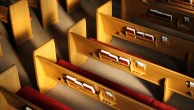What are religious ‘nones’?
“Nones” are adults who describe themselves religiously as atheist, agnostic or “nothing in particular.” This report uses the terms “nones” and “religiously unaffiliated” interchangeably.
Overall, religious “nones” are less likely than adults who identify with a religion to engage in religious or spiritual practices.
In most of the 22 countries analyzed, majorities of “nones” say they never attend religious services. And those who do attend services tend not to go on a regular basis (meaning, they go less often than once a month).
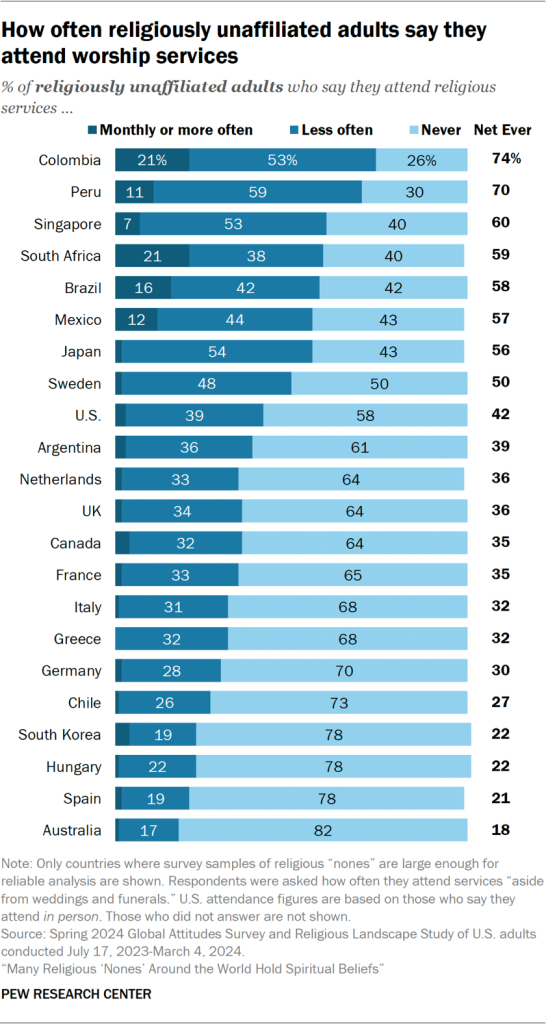
For example, in Germany, 30% of “nones” say they go to religious services at least sometimes, but only 2% say they attend monthly or more often.
Even in places where a majority of “nones” attend services, most of them go less often than monthly. In Peru, for instance, 70% of religiously unaffiliated adults say they ever go to church, but only 11% say they attend at least once a month.
Similarly, in most of the countries studied, a majority of “nones” say they never pray, including 77% in Germany and South Korea.
In general, the countries where “nones” are least likely to pray are in Europe. In Hungary, the Netherlands and Sweden, for example, 87% of “nones” say they never pray. (Other findings show that European countries also tend to have the smallest shares of Christians who say they ever pray.)
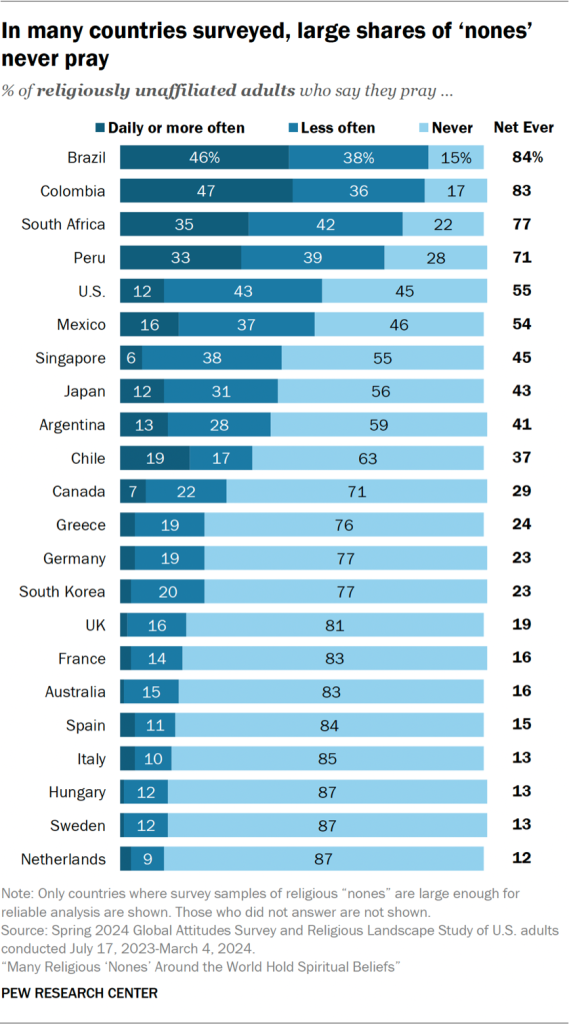
Most “nones” also do not engage in the other religious and spiritual practices asked about in the survey. In most countries included in this report, no more than about one-fifth of “nones” say they light candles for religious reasons; visit fortune tellers or consult horoscopes to see into the future; wear or carry religious items or symbols; or fast during holy times.
Across the countries surveyed, there is no strong pattern of differences on these questions between the three main subgroups of “nones” – atheists, agnostics and people who identify religiously as “nothing in particular.”14 For country-by-country survey results among all three groups, go to the report topline.
Jump to sections on: Spiritual and religious practices of ‘nones’ |
How religious practices vary among ‘nones’ | How the practices of ‘nones’ differ by gender
Spiritual and religious practices of ‘nones’
In the 22 countries studied, “nones” are significantly less likely than religiously affiliated adults to say they light incense or candles for spiritual or religious reasons. In Peru, 20% of “nones” say they do this, compared with 45% of Peruvian adults with a religious affiliation (mostly Christians).
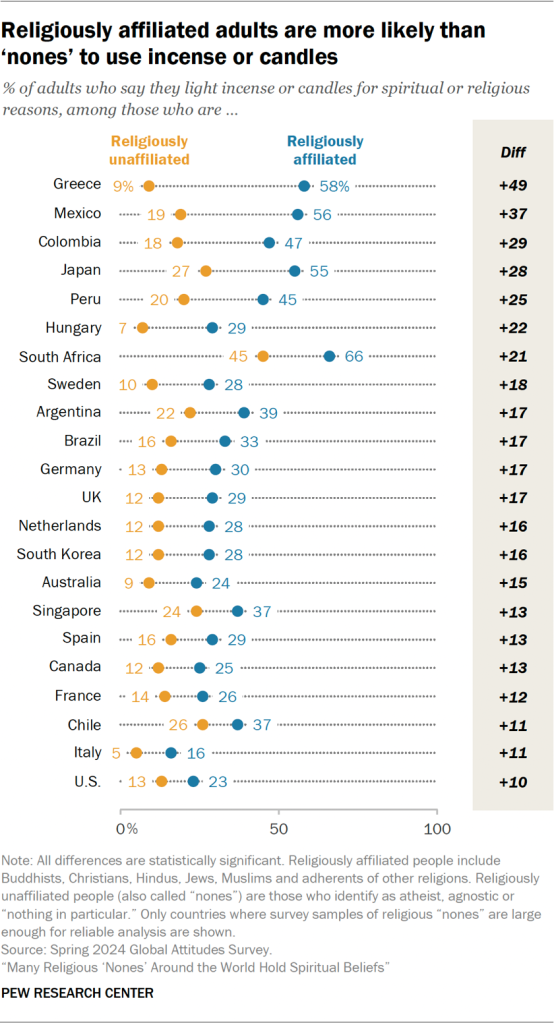
The divide between “nones” and the religiously affiliated on rates of prayer are particularly stark in many places studied. In Italy, for instance, just 13% of “nones” say they ever pray, compared with 85% of religiously affiliated Italians.
On the other hand, “nones” in each country are pretty similar to their religiously affiliated compatriots when it comes to the use of fortune tellers, horoscopes and other ways to see the future. In Mexico, for instance, 12% of adults in each group say they use these methods to try to predict the future.
How religious practices vary among ‘nones’
“Nones” who say religion is not at all important in their lives are generally less likely than “nones” who ascribe at least a little importance to religion to participate in the religious and spiritual practices asked about in this survey.
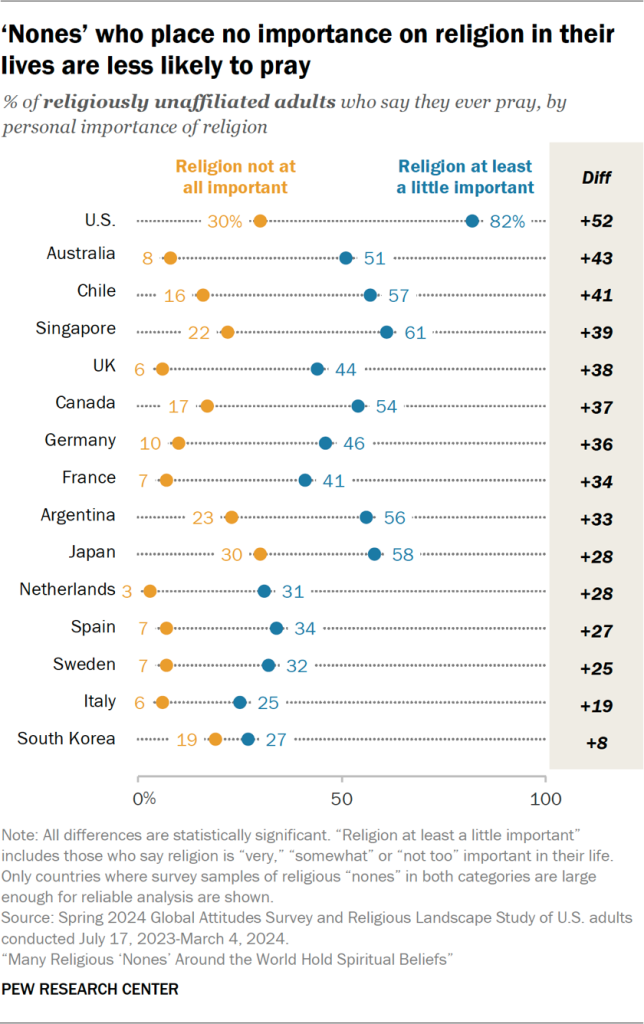
For instance, in all 15 countries with enough “nones” to analyze in both groups, those who say religion is not at all important are significantly less likely than other “nones” to say they ever pray.
In Japan, 30% of “nones” who say religion is not at all important say they ever pray, compared with 58% of those who say religion is at least a little important in their lives. And in the United States, 30% of “nones” who consider religion not at all important say they pray, compared with 82% among other “nones.”
Neither age nor education factor meaningfully into how often “nones” engage in religious practices.
How the practices of ‘nones’ differ by gender
Among “nones” in the analyzed countries, women are more likely than men to say they consult fortune tellers or horoscopes, or try to see the future in other ways. Among Chilean “nones,” for example, women are three times as likely as men to say they use these methods to try to look into the future (27% vs. 9%).

This general pattern is present across the countries we surveyed in the Americas, Europe and Asia.
Among “nones,” women also are more likely than men to say they light candles or incense for spiritual or religious reasons. In the United States, for instance, 19% of religiously unaffiliated women light candles or incense for spiritual reasons, compared with 7% of unaffiliated men.
However, when it comes to the other religious and spiritual practices asked about on the survey, such as attending religious services, there is no strong and consistent pattern of gender differences among religiously unaffiliated adults.
